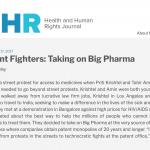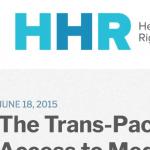This article by PFAM coordinator Fran Quigley was published in the Health and Human Rights Journal. To see the article at its original source, with reference sources hyperlinked, click here.
In September, Allergen, the pharmaceutical company that produces Restasis, announced that it would extend its for the dry-eye medicine patent by selling the patent to the Saint Regis Mohawk, a Native American Tribe. The tribe, located in upstate New York, would receive $13.75 million and claim sovereign immunity so that Allergen could avoid a patent challenge brought by the United States Patent and Trademark Office.
When is a decision on a patent application not a decision at all? When it runs counter to the powerful commercial and diplomatic forces that protect massively profitable pharmaceutical monopolies. Or at least that is what many advocates for access to medicines are saying is the reason behind Indian patent officials last month reversing their own 2015 decision that denied United States-based Gilead Sciences a patent on its hepatitis C treatment sofosbuvir, commonly marketed as Sovaldi. The new decision holds that Sovaldi meets the Indian patenting requirements of novelty and inventiveness. But the earlier decision by the same agency came to the opposite conclusion, holding that Gilead’s drug was not a significant improvement over an already available compound.
For most of human history, life-saving drugs were a public good. Now they’re only good for shareholders.
Along the path toward the creation of a global capitalist system, some of the most significant steps were taken by the English enclosure movement.
Between the 15th and 19th centuries, the rich and the powerful fenced off commonly held land and transformed it into private property. Land switched from a source of subsistence to a source of profit, and small farmers were relegated to wage laborers. In Das Kapital, Marx described the process by coining the term land-grabbing. To British historian E.P. Thompson, it was “a plain enough case of class robbery.”
The flaws of the modern medicine patent system are widely decried. The current system fails to develop medicines to address the health needs of the global poor and creates a platform for unaffordable pricing of the medicines that exist. But even the harshest critics of the patent paradigm recognize the need to provide incentives for vigorous research and development of new medicines. Many alternatives have been proposed. Some are already in operation at limited levels. But these alternatives are poorly understood, even in the global health community.
Mary-Jane Matsolo, wearing tight jeans, gold high-heeled sandals, and a white t-shirt with navy blue block letters reading “HIV Positive,” strides to the front of the Johannesburg conference room. “I’m the one who will make you understand patent laws and intellectual property rights,” she says to the dozen people gathered before her. “It’s what I do, and I do it very well.”
Intellectual property protections for medicines are often overlooked in public discussions of U.S. trade agreements. But they shouldn’t be. Negotiations over such intellectual property can mean the difference between antiretroviral medicine that costs over $10,000 per year—the price originally set in the 1990s by monopoly patent holders—and the eventual grudging concessions that dropped the drug prices to less than a dollar a day. For millions of HIV-positive people in the developing world, that price gap is a matter of life and death. The same dynamic applies to patients in need of medicines to treat cancer, heart disease, and any number of other health conditions.
Representatives of Pacific Rim nations are negotiating a trade agreement that could negatively impact the health of millions. But the high-profile discussion about the proposed Trans-Pacific Partnership Agreement (TPPA) also presents an opportunity for health advocates. This Perspective essay first reviews key proposed terms of the TPPA that would extend the flawed pharmaceutical patent regime and violate multiple human rights commitments. Second, the social movement to ensure access to antiretroviral medicines is presented as an object lesson in successful advocacy for health as a human right. Finally, this essay argues that the attention paid to the TPPA by media, lawmakers, and social justice activists, particularly in the US, creates an ideal platform for advocacy in support of the human right to essential medicines.








